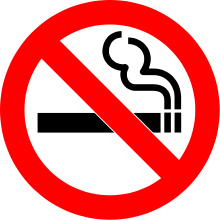With the dawn of a new year comes many promises; promises to live a healthier life, to lose weight, to reach out to friends and to quit dangerous habits like smoking. If 2013 is the year you’ve designated to quit smoking once and for all, a new study published by the British Journal of Psychiatry has some encouraging news.[1]
Many smokers fear that the act of quitting smoking will increase their stress levels; the catch-all soothing effect of nicotine is one of the primary reasons quitting smoking is so difficult. Feelings of depression, anger and stress are all assuaged by the act of smoking. Fortunately, while the initial withdrawal is sometimes extremely difficult, new evidence suggests that after six months of smoking abstention, overall anxiety levels reduce significantly.[2]
The study, which followed 500 smokers who were trying to quit, reported that the 68 who succeeded after six months felt a marked reduction in anxiety levels. The reduction was more pronounced in former smokers that suffered from mood disorders and used cigarettes as a mood elevator, than those who smoked for pleasure.
Success is critical in anxiety reduction, however. Those with mood disorders who failed to stop smoking after six months did suffer from increased stress levels. Those without mood disorders did not report anxiety relapses.
We all know the dangers of smoking, and there is a constant stream of studies reporting new and increasingly risky side effects and medical complications from smoking. If you are sincerely interested in stopping smoking for good, these tips might help to mitigate the withdrawal symptoms:
Start Slowly. Eliminating cigarettes altogether without therapy or medical guidance can lead to relapse; 95 percent of people who quit cold turkey eventually go back to smoking. By consulting a physician, you may find that a medication or nicotine replacement therapy might help take the initial edge off.
Cut back on triggers. If you smoke while drinking coffee or alcohol, try to avoid those beverages during the initial stages of quitting. If you are used to having a cigarette after a meal, try substituting a different activity, such as chewing gum, sucking on a piece of hard candy or brushing your teeth.
Broadcast your goal. Telling friends, family and coworkers can help give you the support you need to stick to your resolution. Also, find a buddy who is also resolved to quit; talking to a friend going through the same thing can help alleviate the emotional withdrawal symptoms. Oftentimes, the dread of censure from someone who knows you are trying to quit is enough to keep you on track!

[1] Quitting Smoking Reduces Anxiety BBC News 1/1/2013 http://www.bbc.co.uk/news/health-20875453
[2] Gastaldo, Evan: Quitting Smoking Actually Reduces Anxiety Newser.com 1/2/2013 http://www.newser.com/story/160231/quitting-smoking-actually-reduces-anxiety.html





